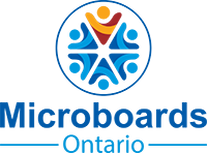Winter 2021 Foundational Microboard Courses Now Available for Registration
Join us for the following series of foundational courses.
For more information, contact our Provincial Consultant, Judith McGill directly via email at [email protected] or by phone at 416-997-3311, or stay tuned for future scheduled sessions here at Microboards Ontario.
The foundational series offers the following four courses:
Microboards 101: An Introduction to Microboards (half-day session)
Microboards 102: The Power of Support Circles/Networks (day and a half session)
Microboards 103: Legal Aspects You Need to Know (half-day session)
Microboards 104: Understanding Complex Communication (full day session)
As family members age, they begin to recognize how necessary it is to share power and decision-making with others who are devoted to ensuring that their family member with a disability is heard and understood. By creating a Microboard together, the family sets out to assist their loved one to strengthen and sustain their relationships and decision-making powers for when they as a family are no longer alive or capable to assist.
People and families that choose to invite others together to form a Microboard fundamentally believe that building strong and abiding relationships is central to a person’s security and well-being. They trust that close, reciprocal relationships help to strengthen a persons’ voice and enhance their willingness to be heard. Most importantly, they believe that everyone deserves and wants to have a sense of purpose in their lives.
For more information, contact our Provincial Consultant, Judith McGill directly via email at [email protected] or by phone at 416-997-3311, or stay tuned for future scheduled sessions here at Microboards Ontario.
The foundational series offers the following four courses:
Microboards 101: An Introduction to Microboards (half-day session)
- What is a Microboard?
- Three key functions of a Microboard.
- Four core beliefs of people and families.
- Fundamental roles of Microboard members.
- Reasons for incorporating.
- Benefits of Microboards.
- When a Microboard may be most helpful.
- Role of Independent Facilitation and other supportive persons.
- Getting ready to create a Microboard.
Microboards 102: The Power of Support Circles/Networks (day and a half session)
- Creating a Support Circle/Network.
- Benefits of a Support Circle/Network.
- Potential challenges and dangers of Support Circles/Networks.
- Keeping the Support Circle/Network alive.
- Creating a new kind of dialogue.
- Role of the Independent Facilitator or other supportive person.
- Planning and decision-making within the Support Circle/Network.
Microboards 103: Legal Aspects You Need to Know (half-day session)
- The rewards and benefits of incorporating a legal entity.
- The roles and responsibilities of incorporation both fiscal and legal.
- Legal concepts that do and do not apply to Microboards.
- Director’s liabilities.
- Managing and protecting assets.
- Managing funding.
- Liaising with Housing trusts and other decision makers.
Microboards 104: Understanding Complex Communication (full day session)
- Understanding challenging behaviours as communication of unmet needs and/or preferences, desires and longings.
- Taking direction from people who communicate in multiple ways.
- Shared meaning making: The task of interpreting and then discerning and reviewing actions and outcomes- holding and testing the hypothesis of what is intended in the communication.
- Drawing out and supporting a person’s “voice” and expressions of will in multiple contexts and multiple ways.
- Communicating through the “doing” and not the saying. Observing and interpreting actions for meaning.
- Broadening our understanding of communication for ourselves and others.
- Learning from and about someone with the help of augmentative devises.
- Setting the pace and direction of change through careful observation.
As family members age, they begin to recognize how necessary it is to share power and decision-making with others who are devoted to ensuring that their family member with a disability is heard and understood. By creating a Microboard together, the family sets out to assist their loved one to strengthen and sustain their relationships and decision-making powers for when they as a family are no longer alive or capable to assist.
People and families that choose to invite others together to form a Microboard fundamentally believe that building strong and abiding relationships is central to a person’s security and well-being. They trust that close, reciprocal relationships help to strengthen a persons’ voice and enhance their willingness to be heard. Most importantly, they believe that everyone deserves and wants to have a sense of purpose in their lives.











